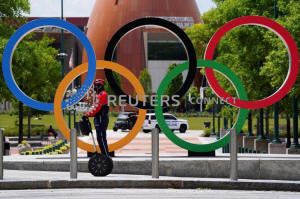|
In a detailed document, the USOPC outlined a
wide range of ways athletes can advocate for racial and social
justice but drew the line at what will be unacceptable,
including wearing a hat or face mask with a hate symbol or hate
speech on it.
In an open letter sent to Team USA athletes, USOPC CEO Sarah
Hirshland said the organisation "values the voices of athletes
and believes that their right to advocate for racial and social
justice as a positive force for change aligns with the
fundamental values of equality that define Team USA and the
Olympic and Paralympic movements".
The USOPC made it clear that the guidelines are only meant for
the U.S. Olympic trials and not the Tokyo Olympics, which are
scheduled to open on July 23.
The International Olympic Committee (IOC) has its own guidelines
with Rule 50 prohibiting protests and demonstrations.
The USOPC said guidance for the Tokyo Games will be published
separately in the coming months once the IOC issues its updated
policies.
Current IOC rules say: "No kind of demonstration or political,
religious or racial propaganda is permitted in any Olympic
sites, venues or other areas."
The relaxing of rules is an about face for the USOPC who
sanctioned two athletes for protesting police brutality and
racial injustice during medal presentations at the 2019 Pan Am
Games in Lima.
Fencer Race Imboden knelt during the national anthem while
hammer thrower Gwen Berry raised her fist, the USOPC later
placing both athletes on 12-month probations.
Under new guidelines these demonstrations will be acceptable.
Athletes will also be allowed to wear a hat or mask with
messages such as "Black Lives Matter" or "equality" or "justice"
and use their voices outside trials venues in other forums such
as social media and the press.
(Reporting by Steve Keating in Toronto; Editing by Ken Ferris)
[© 2021 Thomson Reuters. All rights
reserved.] Copyright 2021 Reuters. All rights reserved. This material may not be published,
broadcast, rewritten or redistributed.
Thompson Reuters is solely responsible for this content. |
|






